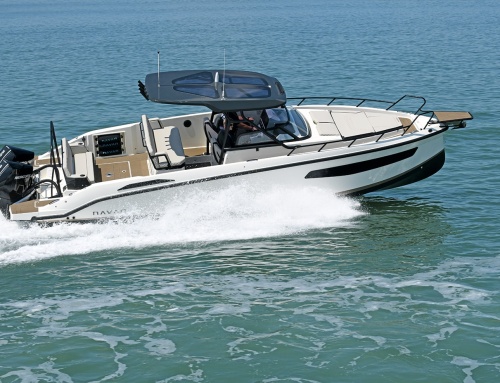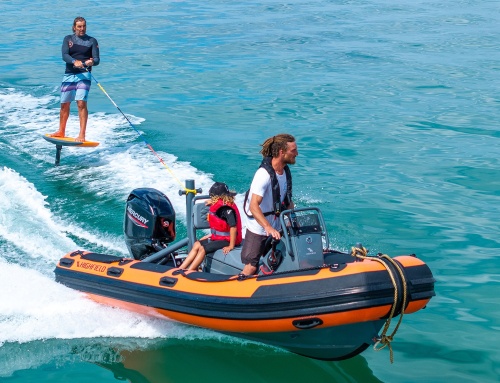- Being a marine surveyor can be a challenging, tough and uncompromising job at times.
- There is no fixed price for a survey and you will find marked variations from one quote to another.
- A good tip and starting point is to only engage a marine surveyor who is a member of a professional body or specialist surveying membership organisation.
In light of the importance to all boaters of safety at sea, Mike Schwartz explores whether the value of a powerboat, yacht and small-craft marine surveyor is incalculable …
Pause for a moment and ponder this question. How much are your life and safety at sea worth? Most people would say they are priceless and impossible to put a value on. And yet many people seem to misunderstand the value and principal role of a marine surveyor, whose very job it is to ensure your safety at sea by surveying, inspecting and reporting on your expensive potential new purchase. Instructing a marine surveyor to work on your behalf should never be seen as a distress purchase where price is the all-important factor.
So if you are about to invest a five- or six-figure sum, let’s say, why would you be concerned about a few hundred pounds for a survey to be undertaken by a professional to ensure the vessel is sound, fit for purpose and worth its price? In reality, a survey is one of the best investments you will make as part of your boat- or yacht-buying process.
Let’s explore further. Marine surveyors come in all shapes and sizes, and from various backgrounds, and have a huge variety of different skill sets. However, as professionals they are bound by a common code of conduct, quite often accompanied by a passion for their work. By using their skills, knowledge and forensic expertise, they can determine whether you are about to make a serious and potentially financially disastrous mistake or not. So why would you not pay a fair price for this invaluable advice?
As a provider of a highly technical, professional service, it could be argued that a marine surveyor is no different from professionals in other industry sectors who have learned their trade, e.g. accountants, solicitors or financial advisers. They provide excellent services and charge an appropriate fee for them, therefore you should not expect a marine surveyor to be any different. In most cases, a marine surveyor has learned their profession over many years.
Choosing a surveyor that’s right for you
So what tips and advice can be offered when you need to instruct a marine surveyor? There are plenty to choose from, and individual standards certainly vary.
Instructing and engaging a marine surveyor can be daunting, even for an experienced and knowledgeable yachtsman or boater, let alone for a first-timer. Logically, many people will choose a marine surveyor based on location. It pays to shop around too as prices can vary, but beware – someone who is considerably cheaper than the rest may not be the best, and, as in most walks of life, you generally get what you pay for!
A good tip and starting point is to only engage a marine surveyor who is a member of a professional body or specialist surveying membership organisation. There are several in the UK and around the world, and some (although not all) vet their members prior to granting membership. It is probably wise to avoid those who are not part of a recognised marine surveying organisation.
It is essential to choose a marine surveyor who has the right skill set and competency to survey your particular vessel and to successfully fulfil your brief and instructions. So for example, if you are planning to purchase a heritage, wooden boat, choosing a marine surveyor who specialises in modern, production, GRP yachts will not be appropriate. A quick check on the marine surveyor’s website should give you an indication, and a listing on one of the professional institute or surveyor membership websites can also help. Ask about their experience of handling projects similar to yours. The sometimes misused phrase caveat emptor – the principle that the buyer alone is responsible for checking the quality and suitability of the service before a purchase is made – most certainly applies here.
Role of the pre-purchase marine surveyor in the leisure market
Experienced yacht and powerboat surveyor and ex-broker Chris Olsen from Olsen Marine Surveying (olsenmarine.co.uk), based in Cornwall, takes up the story:
‘As a professional yacht surveyor our primary role is to ensure that all our clients are given the most thorough, exhaustive and extensive inspection of their intended vessel. A verbal brief often works extremely well, whether the news is good or bad. However, in nearly every case, there are issues found on boats that are not black and white failures. This is where we have to show our professionalism and skill as being knowledgeable about the vessel, carefully deciding on the importance of the faults and putting them into context. A few localised blisters on a 1980s Moody yacht, for example, really is not a structural issue, whereas on a four-year-old cored Powercat these could be the start of a claim for a major warranty issue.’
Chris continues: ‘As surveyors, we not only need to know our boats inside and out, but we also need to have worked on them, building or repairing them, as well as sailing them as much as possible. It is only by having this compendium of knowledge and experience that we can feel confident in giving our clients a balanced, pragmatic view of their chosen vessel.’
A thorough verbal post-survey brief is often invaluable. This either reassures the client that their chosen boat is going to be fine or vice versa. If good news, then the client can start that day ‘living the dream’ of adventures with friends and family on the water. Clients always express their gratitude for this early verbal discussion. A pragmatic survey report then follows, ideally within 48 hours.
‘It is this part of the psychology that can be forgotten by surveyors I have come across over the years,’ says Chris. ‘It is easy to find fault after fault with any boat – that is part of our job – but I strongly believe we also have a responsibility to impart the findings to our client in a realistic and objective manner, so as to make them feel comfortable with our findings. If there are several issues with the boat I find that offering options to repair or replace as required is a much easier pill to swallow than saying there’s a fault. It takes more time, but that is part of the job. Often there will be a need for the vendor and buyer to renegotiate, given the survey findings. A factual but balanced report, or extracts, with options for repair is much easier for the professional yacht broker to handle with the vendor than a list of defects. After all, at the end of the day, the simple truth is that we are all cogs within the wheel in the leisure boat industry. Whichever part of the wheel we are in – surveyor, yacht broker, marine engineer, marina operator or contractor – we all need our clients to buy their chosen boat (provided it is sound), and then really enjoy their adventures on her. That way, they will hopefully then buy another, and we all then benefit.’
The role of the surveyor as fault-finder
Matt Folkes, a competent surveyor based in Poole on the south coast and member of the IIMS Certifying Authority coding committee, offers another view:
‘Along with buying a house, the purchase of a boat can be one of the largest investments one is likely to make. And like a house, prior to commitment it is extremely beneficial to be in an educated position knowing what’s right and what’s wrong, as being armed with this information you will be in a better position to determine whether the boat is of good value and what, if any, remedial work is needed and the associated costs. Ultimately the marine surveyor is a fault-finder and will go through the boat from the bow to the stern, testing, commenting on cosmetic issues, and inspecting the vessel from a build and structural perspective.’
As Matt explains: ‘There are different levels of survey, but as a rule of thumb, the more you pay, the more is covered. For example, a hull and bulkhead survey will comment only on the structural elements of the vessel, and some buyers are content with this as they feel confident in their own abilities, or in the vessel itself – but a full condition survey will include structure, cosmetics, systems, and basin and sea trials, thereby taking longer and costing more. As surveyors, we would like to think we save the purchaser money in the long run.’
There is a plethora of boat manufacturers offering a wide range of vessel types and designs. There are, however, some common issues that surveyors spot and report on more than most. These include:
– A lack of proof of scheduled maintenance on critical equipment, for example engines, generators, water makers, and so on. If service and maintenance records cannot be seen, the surveyor can only presume that the service has not been completed.
– Many modern boats are built to maximise internal volume, which generally results in limitations to access to various areas of the boat. These areas in particular are prone to neglect. Steering compartments are a prime example of this. Whether on sail or power vessels, these areas are either not easily accessible or used as storage areas, which means the working gear is covered.
– Presentation issues. There are numerous TV shows on how to sell your house and dress them to enhance their features, but this information has not filtered down to the boating market: for example, bathroom cabinets full of toiletries; lazarettes full of fenders, warps and spares; engine spaces with oily rags and old filters, and so on.
As Matt says: ‘I don’t know of any surveyor who particularly wants to spend time cleaning out bilges so they can take a good look at the structure, or remove the owner’s smalls so they can look behind a cupboard!’
Instructing a surveyor is the only way to go if you wish to know exactly what you are buying. The survey report empowers the buyer, enabling them to enter the negotiating phase of the process confidently. As a seller, some simple ship husbandry will go a long way towards a defect-free survey report.
How current is the marine surveyor in the market?
Technologies are changing fast and new models come onto the market regularly, some boasting the latest technological developments. New composites and materials are being brought to market all the time too. Are you sure that your chosen marine surveyor is equipped to deal with these? The International Institute of Marine Surveying helps to make this a little easier. Those members who are up to date with their continuing professional development are highlighted with an approved roundel on their website listing.
How much should you pay and what are you being charged for?
There is no fixed price for a survey and you will find marked variations from one quote to another. Sometimes you will be quoted a price per foot, or per metre. Others will quote a set price for the job. Every surveyor has their own methods and way of working. One good piece of advice is to ensure that once the survey is underway, you and/or the vendor are not present as distractions may cause the marine surveyor to miss something. They need to concentrate and focus, so while it is understandable that you want to be on hand and are eager to know the outcome of the survey, the best advice is to remain absent and let the marine surveyor complete the job in isolation.
As a rule of thumb, for a medium-sized production yacht, expect a marine surveyor to be on site for most of the day conducting an in-depth survey and gathering the data they need to compile their report. Most marine surveyors will spend a further full day compiling their report and recommendations, ensuring its accuracy before submitting it to you. So you are paying a professional practitioner for two days of their time.
In Conclusion
Being a marine surveyor can be a challenging, tough and uncompromising job at times. Once instructed, every marine surveyor will want to deliver the best possible survey and report on completion of the job. However, you will not always like their findings and recommendations, and as with any other professional in other walks of life, they have to deliver bad or unpalatable news sometimes. But that is always preferable to knowingly letting someone set out in a vessel that is not fit for purpose, or that may not cope with the extreme demands of the sea, thereby potentially jeopardising their life and property.
Mike Schwarz is Chief Executive Officer at the International Institute of Marine Surveying – www.iims.org.uk









